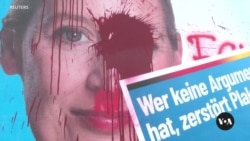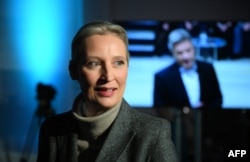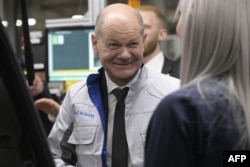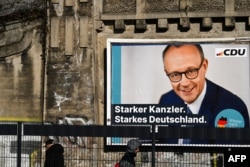Germany is set to hold a general election on Sunday, with voter frustrations over migration at the forefront of a heated campaign.
The center-right Christian Democrats are leading the polls with about 29% support, with party leader Friedrich Merz the front-runner to become Germany’s next chancellor.
The anti-immigration Alternative for Germany, or AfD, Party, which domestic intelligence services are monitoring as a suspected extremist organization, is polling in second place, with 21% support ahead of Sunday’s election.
“I am in favor of the principle that we must make a fundamental distinction between asylum and immigration. The state has not done that so far. Everything is mixed up, and we have had illegal migration into our country for 10 years,” AfD co-leader Alice Weidel said during a televised election debate on Monday.
The AfD has steadily risen in support over recent months, said political scientist Wolfgang Schroeder, a fellow at the Berlin Social Science Center.
“This party has gained more and more support over time, interestingly to the same extent that it has become more radicalized,” he told The Associated Press. “And the main driving force behind this success is, on the one hand, its anti-migration policy, which is very popular in Germany, even in the center of the political spectrum. Then there is their fight against the environmental transformation and their positioning in the Russia war.”
The AfD has campaigned against sending military aid to Ukraine and advocates a closer relationship with Russia.
The party’s policies have caught the attention of U.S. billionaire Elon Musk, who wrote on his social media platform X in December that “only the AfD can save Germany.”
In an opinion article for Germany’s Welt am Sonntag newspaper, Musk wrote, “The portrayal of the AfD as right-wing extremist is clearly false, considering that Alice Weidel, the party’s leader, has a same-sex partner from Sri Lanka! Does that sound like Hitler to you? Please!”
Musk later hosted a live chat on X with Weidel.
Terror attacks
Meanwhile, a recent spate of deadly terror attacks in Germany has intensified the debate over migration.
“And this has been one of the main reasons why the election has been really shifted toward focusing around migration,” said Sarah Wagner, an assistant professor at Queen's University Belfast.
“It’s quite different to the election campaigns that we saw back in 2021, where a lot of the parties were talking quite a lot about climate change, for example,” Wagner told VOA.
Despite its growing popularity in some parts of the country, the rhetoric of the AfD and its supporters repulses many Germans. Large protests against the far right have been held in Berlin and other cities in the lead-up to the election.
Cost of living
While immigration is dominating the campaigns, analysts say the cost of living is at the forefront of voters’ minds as Europe’s biggest economy struggles to emerge from an inflation crisis.
Germany’s past reliance on cheap Russian energy and Europe’s rapid severing of ties with the Kremlin have seen prices soar. Germany’s powerhouse carmakers are facing stiff competition from China, while the threat of U.S. import tariffs looms over the election, along with U.S. demands for a huge rise in defense spending.
Economic pressures led to the collapse of the three-party coalition government in November. Chancellor Olaf Scholz of the Social Democrats wants to increase borrowing to fill a $26 billion hole in the 2025 budget and to help fund military aid for Ukraine.
Friedrich Merz, leader of the Christian Democratic Union, argues that the country shouldn’t take on more debt and should instead seek to stimulate greater economic growth.
“The economy of the Federal Republic of Germany is now bringing up the rear in the European Union. We are in last place,” Merz told lawmakers on Feb. 11.
Firewall
Polls suggest that the Christian Democrats will win the election but finish well short of a majority. Merz has ruled out forming a coalition with the AfD, despite relying on their votes to pass a recent motion in parliament calling for tougher immigration controls.
Mainstream German parties have sought to exclude the far right from power since the end of World War II by refusing to enter coalitions or relying on their votes in parliament, a policy known as the “firewall.”
The policy drew criticism from U.S. Vice President JD Vance, who surprised delegates at the Munich Security Conference on Friday with a speech focusing on a purported democratic backsliding among European allies.
“Democracy rests on the sacred principle that the voice of the people matters. There’s no room for firewalls. You either uphold the principle or you don’t,” Vance said before meeting Weidel on the sidelines of the Munich summit.
‘American interference’
Mainstream German parties united in rejecting Vance’s intervention.
On Monday, Scholz said, “When a vice president interferes in the German election campaign and says extreme right-wing parties are not so bad, I say that we think extreme right-wing parties are bad, and we don’t want to work with them.”
Merz echoed those concerns.
“The Americans are questioning democratic institutions. And they are interfering quite openly in an election, including in relation to democratic parties and their majorities. And I have to say, it disturbs me,” Merz told German broadcaster Deutsche Welle.









